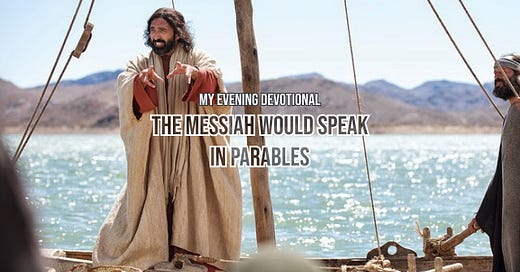Parables held a major place in Israelite history. It was even prophesied that the promised Messiah would speak in parables and dark sayings. The word “parable” comes from the Greek παραβολή (parabolē), a conjunction of para (meaning along-side) and bolē (to throw). Hence the true meaning is found in understanding the symbolic or figurative words that were “thrown alongside” the intended meaning.
Psalm 78:2-4 I will open my mouth in a parable; I will utter dark sayings from of old, things that we have heard and known, that our fathers have told us. We will not hide them from their children, but tell to the coming generation
Parables were a well-established part of the Jewish idiom. God used parables and figures of speech through the prophets (such as Ezekiel, Daniel, and Zechariah). Samson and many others also spoke in riddles and parables.
In the latter part of the Old Testament, God spoke to Israel through prophets, visions, and parables.
Isaiah 6:9-10 And he said, “Go, and say to this people: “‘Keep on hearing, but do not understand; keep on seeing, but do not perceive.’ Make the heart of this people dull, and their ears heavy, and blind their eyes; lest they see with their eyes, and hear with their ears, and understand with their hearts, and turn and be healed.”
The Messiah spoke in parables when he was led by God to do so, which was quite often. Also some of the Messiah’s parables concerning the kingdom of God were for his disciples to understand, but not intended to be comprehended by those whose hearts were not for truth:
Matthew 13:10-15, 34-35Then the disciples came and said to him, “Why do you speak to them in parables?” And he answered them, “To you it has been given to know the secrets of the kingdom of heaven, but to them it has not been given. For to the one who has, more will be given, and he will have an abundance, but from the one who has not, even what he has will be taken away. This is why I speak to them in parables, because seeing they do not see, and hearing they do not hear, nor do they understand. Indeed, in their case the prophecy of Isaiah is fulfilled that says: “‘“You will indeed hear but never understand, and you will indeed see but never perceive.” For this people's heart has grown dull, and with their ears they can barely hear, and their eyes they have closed, lest they should see with their eyes and hear with their ears and understand with their heart and turn, and I would heal them.’
All these things Jesus said to the crowds in parables; indeed, he said nothing to them without a parable. This was to fulfill what was spoken by the prophet: “I will open my mouth in parables; I will utter what has been hidden since the foundation of the world.”
What Jesus Said or What He Meant
The prophecy in Psalm 78:2 predicted that the Messiah would speak in parables. That is exactly what Jesus did according to Matthew, Mark, Luke and John. There are 70 parables and illustrations in the gospels accounts
When interpreting the scriptures, it’s not always what Jesus said that matters, but what he meant. Jesus often spoke from a higher plane or a spiritual point of view. For example, when Jesus spoke of the leaven of the Pharisees, he was referring to their false teachings. At first the disciples did not understand what Jesus meant; they thought he was speaking literally about the leaven of bread:














Share this post